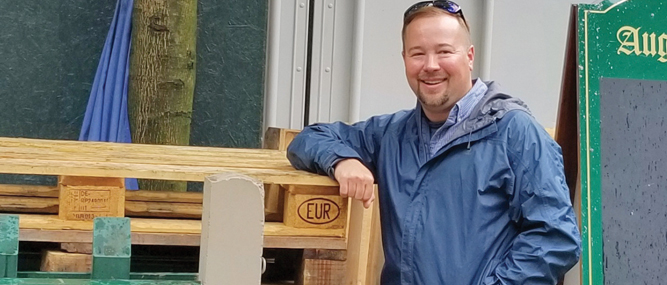Rock legend Tina Turner sings a song with the lyrics, “What’s love got to do, got to do with it. What’s love but a second-hand emotion.” She was singing about romantic love. Frequently today in the work world, the concept of leading with a loving attitude is viewed as soft and weak. Others worry it could lead to many legal pitfalls.
People might think, “How can you expect others to respect you if you are talking about bringing a loving attitude to your employees.”
In reality you may be able to get people to fear you without love, but you will never truly earn their respect unless you demonstrate love by your actions. Love is not soft. Love finds better ways to identify issues, bring correction and hold people accountable.
I have been thinking a lot about the “mushy love stuff” ever since I attended the Kingdom Business Workshop that took place in late September. The event was put on by James Ruder and L&R Pallet in conjunction with Pallet Enterprise magazine and the Under1Roof Foundation. The Enterprise is proud to have been a co-sponsor because our staff believes in the principles and transformation that have affected how Ruder runs his company.
The theme of the event was Love Works based on the book by featured speaker Joel Manby, former CEO of SeaWorld Parks & Entertainment, Herschend Family Entertainment and Saab Automobile USA. Manby’s topic is important for all pallet companies because creating the right corporate culture is no longer optional. Regardless of your faith beliefs, you need to find a way to recruit and retain good employees. And the number one thing that will get people to stay if you can’t pay the highest amount is a good culture creating an atmosphere where people want to work.
Manby, who was featured on the hit TV show CBS’ Undercover Boss, declared that many people have the wrong idea about what it means to truly love your fellow co-worker. Sure, it calls for a caring attitude that seeks to understand the other person. But it doesn’t mean that you have to let employees get away with slacking off or producing poor quality work. Love doesn’t mean you gloss over problems or concerns. It just changes the tone and attitude in how you bring instruction and even correction.
While there can be various shades and degrees of work cultures and environment, Manby primarily contrasted loving/caring approaches with fear-based/top-down leadership tactics.
One of the problems with fear-based leadership is that most people don’t know they do it or would never say, “Yeah, I lead through fear.” Usually, this is not just one leader too. It tends to be an organizational thing as one boss imposes his/her will on subordinates. It creates an aggressive pyramid of leadership tension.
Manby cautioned, “If you pay less, you do need a better culture to retain employees.” Building this culture usually centers on care and respect. If you rule through fear, your employees may be less truly engaged even though they go through the motions. They will do just enough not to get fired or reprimanded. But they won’t really buy into the vision.
Some may think, “Love as a business principle suggests weakness.” Manby counters this notion with the reality that love doesn’t eliminate the need for accountability. It just provides a framework to ensure honest feedback is heard and truly followed. He suggested that love is grounded in truth, and you can’t truly separate the two. Manby explained, “Being truthful is not sugar coating a situation. It is what makes leadership really hard.”
One method that Manby uses is providing direct feedback focused on these three words: Start, Stop and Continue. He encourages managers to explain what employees need to start doing, stop doing and keep on doing. This may be simple. But it can provide the framework for discussion that is easy for workers to navigate.
Instead of starting with a long laundry list of things that need to be fixed in an organization or process, Manby said that managers should do fewer things. They should actually change what they can and empower workers to lead the process.
Your company needs to develop a way to deal with employee conduct. But instead of taking a more disciplined approach, what happens if you take a more developmental approach? This requires more patience, but at the end, you may get more engaged and better performing employees.
James Ruder at L&R Pallet revealed that his company tries to take a positive attitude toward addressing concerns with worker performance. Safety or company violations are reviewed in positive terminology where the situation is explained and an action plan is put into place.
L&R never writes up workers, instead they develop “Opportunity for Growth Plans.” This approach removes some of the sting of doing something wrong while focusing on learning the valuable lessons needed to do things right.
L&R Pallet trains supervisors on every department so that they can spot problems even as they walk through the plant. These managers wear yellow hats and are easily identifiable. They have the right to stop and talk with employees in other departments when they notice safety or other concerns.
Love is not soft, it is just understanding. It seeks to help the worker improve without shaming or causing unnecessary conflict. When you have autocratic, top-down leadership, you can easily create shut down moments that cause people to disengage from your company or organization. They tend to leave, tell others and take some with them.
What can you do to improve your culture? Take a look at what you are doing and ask, “Does this create the kind of environment where I would want to work?”
Love isn’t a second-hand emotion, it may be the key to developing the kind of culture that makes people want to stick around.




